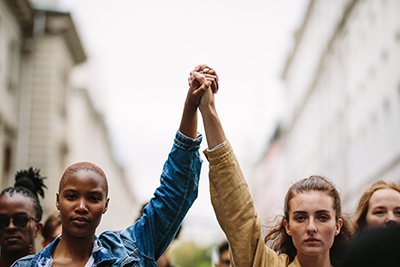What will come of the wreckage of a divided America?
It's in our hands
Posted on October 30, 2020
 Several weeks ago, I found myself straddling the centerline of a rural highway, kneeling on hot asphalt, aiming a charged fire hose at the aftermath of a head-on collision. Neither car was yet burning, but fluids leaked ominously from both, slicking the road in places.
Several weeks ago, I found myself straddling the centerline of a rural highway, kneeling on hot asphalt, aiming a charged fire hose at the aftermath of a head-on collision. Neither car was yet burning, but fluids leaked ominously from both, slicking the road in places.
Behind me on the blacktop, a Life-Flight helicopter sat like an insect at rest. Ahead was a chaos of ambulances and patrol cars, with men and women rushing in several directions. One car sat centered in the road empty — its driver and passenger whisked way to the nearest consequential town. The other vehicle lay over the guardrail, its cabin obscured by laboring figures.
Here’s what I saw: A team working with hydraulic shears and spreader to cut apart the car’s cab; emergency medical technicians positioning a litter beside the door; the driver painstakingly pulled free and carried away, moaning but alive.
Almost everyone involved in the rescue was unpaid, belonging to the volunteer fire departments of two small towns. Like me, they had dropped a day’s work — leaving bolts untightened and irrigation dams unmoved — to come to the aid of a stranger.
I knelt in heavy gear, sweating in the sun, proud of how we sometimes come together when it matters. Grim as the scene was, it gave me hope. Perhaps this was because it seemed such a pure example of people caring for each other and acting on that care.
Something else struck me, too: That strain of neighborly cohesion — that practical flowering of common cause — is the animating force of democracy. A sense of greater community is the root of our self-governance, and such a sense emerges most readily in response to crises.
By any measure, 2020 presents a state of emergency. Forests blacken to cinders across the West. Communities large and small blaze against deep-rooted police brutality and racial inequalities. COVID-19 patients burn with fever in hospital beds. It’s the sort of year that ought to galvanize us as a people. It ought to draw the best from us, joining us in mutual aid and care.
Why, then, do we find it so hard to pull together? Why, in this crucial moment in our history, are we unable to approach each other with appropriate empathy and respect?
Complex questions, but here’s the start of an answer: We’ve forgotten that in a democracy, we are all neighbors, and neighbors are responsible for each other. The nation burns, but instead of fighting fire together, we ignore our shared humanity. We speak only to the like-minded, turning away from hard and necessary conversations. Because of this, we’re becoming a fractured, fearful people.
We are a wounded nation. Some of the damage is self-inflicted, but the larger and more recent blows have been laid on us by powerful people acting in bad faith. We have been hurt by politicians and pundits who profit from dividing us.
Healing will take time, but the triage must start now. To that end, consider the two people contending for our highest office. Set these pages down and conjure each man in turn. Bring him into your mind’s eye and examine the facts of his life, rather than what people say about him. Ask yourself: How has he used his time on this good earth? What truly matters to him?
Ask if he stands ready to drop what he is doing, put aside his own interests and enrichment, and strive for the common good. Ask if he meets suffering with real empathy, because that, in a nutshell, is what we need right now.
This moment is important. It’s a fork in our national road. To come through whole and on the right track, we need leaders who place the common good above personal interests. We need politicians who understand the difficulty and necessity of healing — leaders who will serve rather than rule us.
We deserve as much. At our core, most of us care for our neighbors regardless of politics, race or station. Encountering suffering, we do not see a moment of weakness to exploit, but a chance to render aid. We must demand equal decency from our leaders.
While a wrecker cleared the ruined cars, I waved backed-up traffic through the scene. Most drivers — certainly a high enough percentage to win any election — looked at the wrecks with honest concern. They cared. Almost none of them seemed angry, though they had been waiting hours on hot pavement. People thanked me through open windows, and I thought: We can turn this thing around.
Not long after that day, I was talking to a firefighter with decades of experience — a veteran of terrible fires and wrecks. “When it comes down to it,” he said, “all we have is each other and our tools.”
Well, we’re down to it in 2020. We have each other, the potent tool of our political process and a hell of a lot on the line.
Bryce Andrews lives and works on a Montana cattle ranch and has written two award-winning books, "Badluck Way" and "Down from the Mountain."
*------------------------------------*
Webmaster’s Note: A viewer recently wrote to ask, “Are you at all concerned that conservatives might be put off your site by your ”Race-Relations” page?
I responded: No. On can be a conservative and still be against murder and brutality, and for for equal justice under the law, enforcement of the laws of the US without regard of religious affiliation.
My major concern is for the confusion I could see in the public’s response to the chant, “Black Lives Matter.” It was evident that many were not understanding the concern of millions who are demonstrating against systemic racism against people of color in the US and elsewhere around the world. And for many, that lack of understanding just adds the climate of fear and anxiety in the country. And using rational thinking to mitigate fear and anxiety was a part of my mental health counselor job description for many years.
“Institutional racism, also known as systemic racism, is a form of racism that is embedded as normal practice within society or an organization. It can lead to such issues as discrimination in criminal justice, employment, housing, health care, political power, and education, among other issues.” [Wikipedia] Social racism is a different matter.
Systemic racism is imbedded in our laws, regulations, and operating procedures. These can be addressed by making changes in laws, regulations, and operating procedures to eliminate racial injustice. Most pressing is in the news is the seemingly common execution of black men (often unarmed black men) by certain police officers—often those with histories of excessive violence.
I hope to be of help to our viewers by collecting materials that help explain demonstrators concerns about systemic racism in our culture to those people who lack access to the information in our local and national newspapers provide. And to that end we encourage our viewers to subscribe to digital services of the Seattle Times, the New York Times, the Washington Post and the Associated Press. If you can’t get the papers delivered to your door, you can read their prize-winning investigative journalism at a convent time on your smart phone or tablet.
I also remember my social studies class years ago in the middle of Nebraska in Elm Creek High School. We had such limited access to information back then and I wonder about many homes currently receive a daily newspaper. Some students, I’m sure have digital access but not all. I dedicate this collection to them.
SEE ALSO:
More Race Relations Articles
Sexual Bias Articles
Mental Health Articles
How Drugs and Alcohol Affect the Brain and Body
WA. Counselor Directory: find a therapist near you
How helpful is this web page to you?
(and how can we can improve this page for you?)
not helpful
very helpful
Other Articles
Are American racial truths a threat to Trump?
“I didn’t know.” Those were the first words my friend, a white guy named Dave, spoke to me the day after the first episode of “Roots,” which depicted the capture and enslave... read more
A monstrous breach of the First Amendment
“Congress shall make no law respecting an establishment of religion, or prohibiting the free exercise thereof; or abridging the freedom of speech, or of the press; or the right of people peaceably to a... read more
A possible America begins with anti-racist training
Racism is not American. Talking about and fighting racism is.
On Sept. 4, President Donald Trump pledged to identify and cancel all anti-racist training contracts for federal government agencies, calling them “divisive, un-American propaganda trainings,&rdqu... read more
Structural racism and systemic change in education
How you can get involved in educational changes
Education Lab: Seattle Times July 19, 2020 Education Lab is a Seattle Times project that spotlights promising approaches to persistent challenges in public education. It is produced in partnership with t... read more





